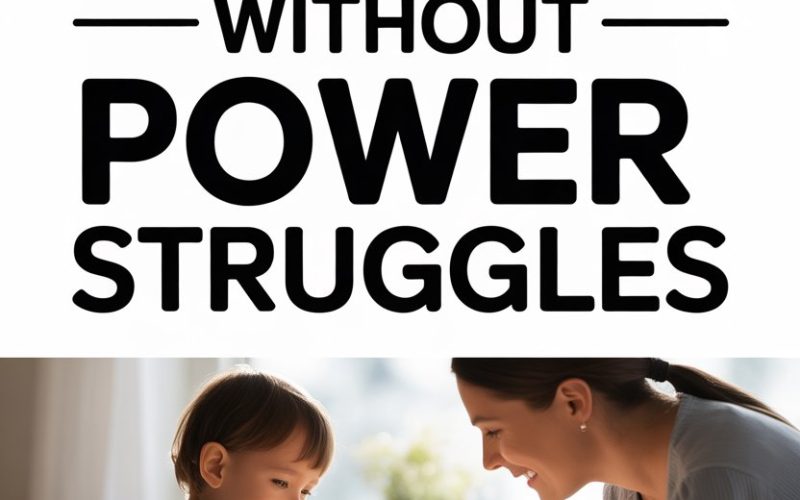There you are, pleading with your child to put on shoes while they’re dramatically flopping about like a fish on the carpet.
You’re late. You’re sweating. Your coffee’s gone cold (again).
If you’re reading this with one hand while wrestling a toddler into trousers with the other, you’re in the right place.
Parenting without constant power struggles isn’t just for Zen monks or those mythical “calm” parents you meet at the park. It’s for real, regular humans who sometimes hide in the loo to eat chocolate in peace.
It’s possible, I promise. And you don’t even need a PhD in psychology—or an unlimited supply of biscuits—to pull it off.
Rethink What “Winning” Means
It’s tempting to view every “No!” as the beginning of a battle you need to win. But if both sides end up in tears (or sulking in their respective corners), nobody’s really victorious.
Instead, imagine parenting as more of a dance than a wrestling match. Sometimes, you’ll lead. Sometimes, your child needs a chance to set the pace.
Dr. Laura Markham, author of “Peaceful Parent, Happy Kids,” points out that connection trumps control every time. When the relationship comes first, compliance tends to follow as a side effect.
The Magic of Choice
Children have very little actual control over their little kingdom. That’s why they’ll dig in over what seems like the tiniest issue—because it’s one of the few places they can.
Offering genuine choices restores balance and gives your child a sense of power (without handing over the keys to the castle). Try, “Would you like to put on your red shirt or your blue one?” rather than issuing a command.
If neither shirt is appealing, let them surprise you: “You want to wear your Spiderman cape to Nana’s? Brave choice, mate.”
Just be careful not to offer fake choices. (Nobody enjoys, “Peas or more peas?” Not even you.)
Pick Your Battles Wisely
Nobody wants to admit they sometimes argue with a four-year-old about which way socks go on. Yet, here we are.
The secret? Not every hill is worth dying on. Safety, kindness, and health matter. Clashing over mismatched socks or a questionable hairdo? Not so much.
If you find yourself about to debate the nutritional merits of breakfast cereal versus leftover pizza, pause. Is this about your child learning, or is it about wanting things your way?
Sometimes, letting go is the fastest route to peace.
Connect Before You Correct
Picture this: You’re mid-email and your partner interrupts with a list of chores. Do you leap off the sofa, heart full of gratitude? Or do you feel yourself bristle?
Kids are people too. They don’t respond well to demands out of nowhere.
Look them in the eye, use their name, and add a bit of warmth: “Hey, Elsie, I know you’re busy building that Lego tower. Five more minutes, then it’s time for your bath. Shall I set a timer?”
This small pause, sometimes called “joining your child’s world,” lays the groundwork for smoother transitions.
Make Directions Playful When Possible
Let’s be honest, “Put your shoes on NOW!” rarely ends in harmony. But “Can your shoes hop to the door like kangaroos?” might just do the trick.
Turning tasks into a game, a race, or even a silly song (yes, even if your singing voice is more tortured cat than musical prodigy) can ease tension and make cooperation more likely.
Research from the Greater Good Science Center suggests playful interactions not only diffuse conflict but also strengthen connection. Who knew “marching like dinosaurs to the bathroom” could be evidence-based?
Empathy is Your Secret Weapon
Kids lose it over the oddest things. Crushed biscuits. The wrong cup. Socks with “the line” in the wrong place. When you’re running on fumes, it’s easy to respond with eye rolls or sarcasm.
But try meeting the meltdown with empathy. “You really wanted the blue cup. That’s tough, isn’t it?”
You don’t have to agree, but showing you understand helps children feel seen—and more willing to cooperate next time.
Psychologist Daniel Siegel explains that this “connect and redirect” approach helps calm the emotional brain so kids can actually hear you.
Stay Consistent but Not Rigid
Structure and predictability help kids feel safe, but inflexible rules can turn every interaction into a standoff.
It’s absolutely fine to bend sometimes, as long as your core values are clear. Maybe bedtime is 7:30, except when there’s a special event or a story is just too good to cut short.
If the rules change, explain why. “Normally it’s lights out, but since it’s movie night, you can stay up a bit.” This shows you’re not arbitrary, and reassures kids that you’re in charge—and fair.
Use Natural Consequences Instead of Punishments
Picture this: Your child refuses to wear a coat, and you’re heading out into a chilly morning. You could threaten, cajole, or plead—or you could let them feel the cold for themselves (with a coat tucked under your arm for the inevitable surrender).
Natural consequences teach far more than lectures ever could. They also remove the parent from the role of “bad guy,” turning the situation into a learning moment instead of a showdown.
Just make sure the consequence is actually safe—nobody needs a lesson in hypothermia.
Stay Calm Even When They Don’t
This one’s about as easy as doing yoga in a room filled with hornets, but it’s powerful.
Kids borrow our emotions. When you keep your cool, you’re showing them self-regulation in real time. If you feel yourself teetering on the edge, pause. Take a breath.
Announce that you’re feeling frustrated and need a minute. You’re modeling healthy coping, and giving yourself a precious moment to regroup.
Need help? The Parenting Science team offers evidence-based tips for managing parental stress—no spa weekend required.
Apologise When You Get It Wrong
Every parent loses the plot sometimes. Maybe you shout, slam a door, or say something you regret. When that happens, own it.
“I got angry and yelled. That wasn’t fair to you. I’m sorry.”
Children learn more from how we handle mistakes than from any lecture. Modelling vulnerability and responsibility is the opposite of weakness—it’s a parenting superpower.
Reinforce Positive Choices
When your child manages to cooperate (even a little), notice it. A simple “Thank you for coming to the table the first time I asked,” works wonders.
Reinforcing positive behaviour is far more effective than punishing negative. If your child gets more attention for good choices, they’ll try to repeat them.
If you fancy diving into the science, this Harvard article on positive reinforcement is a tidy summary.
Don’t Be Afraid to Press Reset
Rough day? Power struggles piling up like laundry? It’s never too late to hit pause and start over. Announce, “This morning’s been tricky. Want to try again?”
Children are remarkably forgiving. Often, they’re desperate for things to be right between you. Sometimes, you both just need a snack and a cuddle before harmony returns.
When You Need Backup
You’re not supposed to have all the answers. Raising kids is hard, and sometimes you need a hand.
Lean on other parents, ring up a grandparent, or check in with your child’s teacher. If the battles are unrelenting, or you’re worried about your child’s wellbeing, there’s no shame in seeking professional advice.
Organizations like Parenting Now and Triple P – Positive Parenting Program offer support for families across a range of sticky situations.
Why Parenting Without Power Struggles is Worth It
Nobody’s suggesting you’ll float into the kitchen tomorrow to find your children quietly brushing their teeth and complimenting your cooking. Parenting is messy, loud, and full of unpredictable plot twists.
But when you shift from power struggles to partnership, daily life loses some of its bite.
You get fewer battles and more laughter. Your child grows up feeling respected—and learns to respect others.
And you? You might even get to drink your coffee while it’s still warm.
Now, if only someone could solve the mystery of the vanishing socks…




